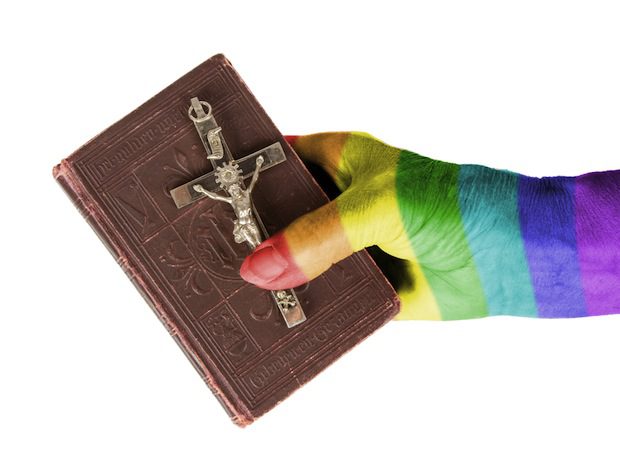Future Shock

On the eve of the Supreme Court’s decision in the same-sex marriage case, a reader sends in this reflection from the gay novelist Alexander Chee, who imagines what the queer future in America will look like. Excerpts:
If I were to write a novel about a gay man like myself in the future—let’s say the year 2035—his ability to marry another man, whatever the Supreme Court ruling, wouldn’t be in question—it could even be the conventional choice, the one his friends laugh at even as they attend because they love him. He might even be descended from two generations of officially recognized gay marriages. “Gay,” “Queer,” “Straight,” “Same-Sex”: these would be deeply retrograde terms—orthodoxies to be resisted, or historical fictions, even. Given the press of overpopulation on us now, I could imagine my character as having chosen a childless, single queerness, and could depict this as the green choice, sexually and emotionally. The rearing of children could be something that is done only rarely, especially given its increasing cost. More and more, having children is something only the wealthy can afford in the United States, so in 2035 it wouldn’t be science fiction to imagine an entrenched oligarchy as the only class legally allowed to have them. In a political twist, China’s one-child policy could be seen retroactively as both visionary and not having gone far enough.
My protagonist could find the process of questioning his sexuality and gender as normal as we now find deciding what to watch on television. He might have no single sexual identification—omnisexuality—and that could be the overwhelmingly mainstream norm. Or he could be a part of an elite group of wealthy gay men, all of them seronegative and residing in an intentional community sexually sealed off from anyone who can’t pass a credit check and an HIV test.
Ha! A gay Benedict Option! More:
Marrying more than one person at the same time might also be possible for him within this system, especially if marriage is finally seen as the economic system it is—with fundamentalist Mormonism as something of a model for the legal future queer, but more like if the sister wives all ran away with each other and set up a home together. Or maybe my protagonist lives closeted inside a Christian radical white supremacist plantation state, complete with death camps for sexual deviants, married to a woman who is, perhaps, closeted herself.
Yet, when I think of the future for myself in real life and not fiction, I stick to what I know. Which is almost nothing. My hope is that marriage equality queers marriage, rather than straightening queers—that we reinvent it and keep reinventing it, and sexuality is finally acknowledged as having no inherent moral value except, perhaps, when it is ignored.
Emphasis mine. I remember a time, practically the day before yesterday, when conservatives who warned that gay marriage would inevitably deconstruct marriage and family entirely were called paranoid bigots. Well, I think Chee is pretty much going to live to see what he hopes for. How were we supposed to know it would come to this? some people will say.
Meanwhile, the NYT reports that orthodox Christian institutions are preparing for a fight to maintain their tax status in the face of the inevitable SCOTUS ruling. Excerpts:
The religious schools are concerned that if they continue to ban gay relationships, the Internal Revenue Service could take away their taxexempt status as a violation of a “fundamental national public policy” under the reasoning of a 1983 Supreme Court decision that allowed the agency to revoke the taxexempt status of schools that banned interracial relationships.
In a recent letter to congressional leaders, officials from more than 70 schools, including Catholic high schools and evangelical colleges, said that a Supreme Court ruling approving same sex marriage would put at risk all schools “adhering to traditional religious and moral values.”
“I am concerned, and I think I’d be remiss, if not naïve, to be otherwise,” said Everett Piper, the president of Oklahoma Wesleyan University, in Bartlesville. “This is not alarmist thinking. This is rational listening.”
Some legal scholars interviewed by the Times say it probably isn’t going to be an issue right away, because it would be too politically hot.
That sort of analysis does not do much to calm religious schools’ concerns, said Richard Garnett, a law professor at Notre Dame.
“Although many people insist that this will not happen,” he said, “they tend to rely on political predictions — which are probably accurate, in the short term — and not on in principle arguments or distinctions.”
The reasoning SCOTUS deploys in what is widely expected to be a decision constitutionalizing same-sex marriage will give crucial clues as to the likely future of tax-exempt status. The politics of the present moment will likely protect schools.
Even so, said Eugene Volokh, a law professor at the University of California, Los Angeles, religious schools have real reasons for concern.
“If I were a conservative Christian (which I most certainly am not),” he wrote on a law and religion email list, “I would be very reasonably fearful, not just as to tax exemptions but as to a wide range of other programs — fearful that within a generation or so, my religious beliefs would be treated the same way as racist religious beliefs are.”
It’s coming. Of more immediate concern is the perfectly legal actions that will be taken by private entities to marginalize orthodox religious schools. They will be pariahs, very soon. Of much more significant long-term concern is how the church survives, and ministers to, a culture in which marriage and family as we know them will be unwinding even more rapidly than it is today.
Subscribe for as little as $5/mo to start commenting on Rod’s blog.